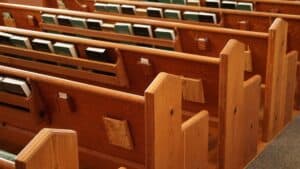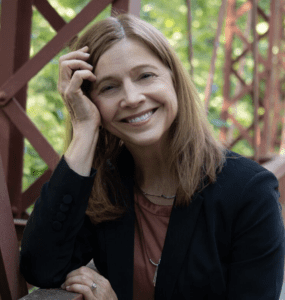 Our boat pushed off, and I let out a deep sigh of relief. As we set sail across the Hudson River, I could see dozens of others—commuter ferries, fishing boats, dinner cruise ships, party boats, tugboats—rushing to rescue the thousands of people who, like us, had survived but been trapped by debris from the burning, crumbling Twin Towers on September 11, 2001.
Our boat pushed off, and I let out a deep sigh of relief. As we set sail across the Hudson River, I could see dozens of others—commuter ferries, fishing boats, dinner cruise ships, party boats, tugboats—rushing to rescue the thousands of people who, like us, had survived but been trapped by debris from the burning, crumbling Twin Towers on September 11, 2001.
As our boat sailed west, I turned toward the downtown Manhattan skyline. A dust cloud hovered over the spot where the Twin Towers once stood, stretching beyond the end of Battery Park out into the harbor. For three hours prior to getting this ride, we’d been among those covered in gunk, dodging smoke, desperately searching for a clear air pocket and a way to safety.
Leaving home
Brian had shaken me awake after the first plane hit. After we watched the second plane crash into the South Tower, just six blocks away, we ran down 24 stories, me barefoot and in my pajamas. Soon we were covered in the sticky gunk that had filled the air after the towers collapsed. We weren’t sure we would survive, and at one point, we said goodbye to each other.
When the boat dropped us off in New Jersey, we were filthy, traumatized, and had little understanding of what had just happened to us. Only two things were clear: we weren’t going to get back to our home any time soon, and we had no idea where to go or what to do next.
We walked for blocks, at one point encountering a beautiful soul who saw our desperation and invited us into her apartment for water and a restroom break. Eventually, we huddled with dozens of others on the lawn of a B.J.’s Club, where we traded ideas about what to do next.
Mayor Giuliani had ordered the evacuation of Lower Manhattan at 11:02 a.m. and no one knew how long the area would be vacated. We knew we were the lucky ones—the ones who had survived. However, my husband and I and roughly 25,000 others were suddenly urban nomads. Most of us had fled with only the clothes on our backs, and no one knew when we could go back home—or if we still had a home. At that time, it had been reported that the falling towers registered as an earthquake and had potentially shaken residential buildings off their foundations.
Housing was our first concern. With a hotel manager reluctantly allowing us to bring our dog along, we managed to find a hotel room for the first night. The next day, we made our way back to Manhattan and crowded in with a close friend in her tiny Hell’s Kitchen apartment.
After several nights there, we took refuge in a stranger’s apartment. She was participating in a program that offered shelter to displaced New Yorkers, and we gratefully accepted respite in her home for a few days. Even though we were among a huge number of people who had been displaced, I nevertheless felt alone and isolated.
Having no knowledge of when we’d be able to go home and bouncing from place to place made me feel out of control. I was surprised at how discombobulated and dehumanizing it was to not be able to sleep in our own bed.
Trauma leads to hope
We had evacuated our home with nothing, so I spent my days searching donation depots, collecting clothes, toiletries, and food that had been donated by New Yorkers who wanted to help. I’d donated and volunteered at these institutions in the past, but this was the first time I was on the receiving end.
Although we didn’t recognize what was happening to us, Brian and I soon began exhibiting signs of post-traumatic stress disorder. He slept around the clock, and I couldn’t sleep at all. In perpetual fight-or-flight mode, I jumped at the slightest noise.
Twelve days after we fled, we were able to return to our apartment. It was filled with dust and debris, but it was home. Although Brian and I would struggle for months with grief and trauma, it was comforting to be home.
Our recovery was helped through caring connections at Redeemer Presbyterian Church, who supported us financially and emotionally. The church bore witness to my pain and validated my experience. And they cared. I walked out the door at the end of our meeting, holding an envelope with financial help. And something shifted inside of me.
I felt hope.
That simple act of Christian mercy had begun the process toward restoring my faith in God. The weight of injustice I’d been carrying began to lift, and I had a new desire to learn more about God.
A new mission
Brian and I began to worship at Redeemer, eventually making friends, joining Bible study groups, engaging in church activities, and volunteering with outreach programs. All of these things led us into a deeper relationship with Christ.
Over the years, I realized how transformative it had been for me to be able to speak about my experience to someone who listened and cared. I wanted to pay it forward and provide the same for others, and I developed new passions for social justice causes.
Even though I’d spent only two weeks being displaced after 9/11, it left a big impression on me. I began to spend time with Christian organizations that help those who are homeless and refugees. I became the director of missions at my church, where I assembled teams to help in the aftermath of natural disasters.
As I both healed and reached out to help others, my life took on a new direction. My husband and I founded a nonprofit organization to give us a wider platform to address injustice, which brought our 9/11 experience full circle.
In this broken world injustice and suffering are a constant presence; however, as I look back on the past 20 years, I realize that all of my current endeavors and blessings are a direct result of God meeting my husband and me at our lowest point.
The Bible teaches that the world is not our home and that our earthly roots should be in Christ alone, because our final citizenship is in heaven. As a result of that assurance, we have the freedom to give away in increasing measure to others. This has been the blessing of my life.
Christina Ray Stanton and her husband are long-time residents of New York’s Financial District. She is travel guide and also works as the Director of the Short Term Missions Ministry at Redeemer Presbyterian Church. She is founder of the nonprofit Loving All Nations.


